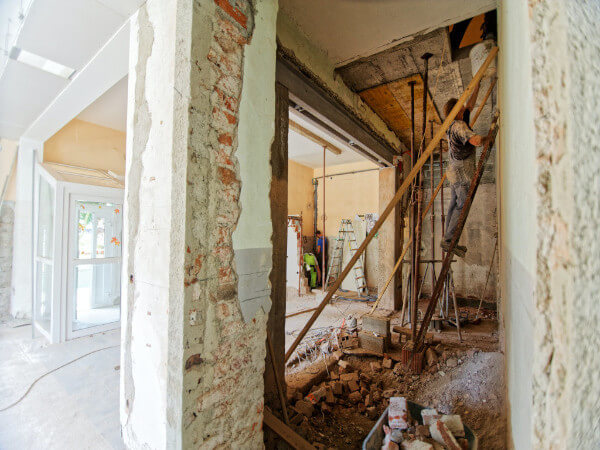Rapidly Connect Third-Party Apps with Autodesk Construction Cloud
Get to know the App Gallery
Construction projects are complex. This is often due to various stakeholders using different technology solutions specific to their needs. That’s normal, but this creates problems when decision-makers need to bring together countless, disconnected data points including financial information, scheduling, performance data, and more.
As such, it’s critical that project teams tightly integrate the many moving parts of a project using a single source of truth. Achieving that lies in how easy it is to connect third-party solutions to your chosen construction platform. The goal, of course, being to make project data readily available when and where decision-makers need it.
We have good news. The App Gallery in Autodesk Construction Cloud (ACC) now enables Account Admins to connect ACC with various third-party applications including field management solutions, reality capture apps, AR tools, and more. Currently, the App Gallery supports over 35 different integrations with many more to come. It also leverages the Forge open platform, letting users experience seamless data flow, so everything—and everyone—stays in sync across the entire project lifecycle.
Let’s take a closer look at what the App Gallery offers.
App Gallery at a glance
The App Gallery enables Account Admins to:
- Find apps that are vetted and approved by Autodesk, to guarantee that they work properly with the platform
- Extend the capabilities of the construction platform by seamlessly connecting Autodesk Construction Cloud with various third-party applications
- Browse and discover new or existing applications that can streamline steps and processes across the project lifecycle
Key benefits of the App Gallery
Using the App Gallery within ACC allows you and your team to connect data from otherwise disconnected sources. Here’s a look at why the App Gallery is so useful to Account Admins, and the project teams capturing, managing, and using that data.
Simplifies connections to 3rd party solutions
The App Gallery allows teams to easily set up connections directly from within Autodesk Construction Cloud, so they can get up and running quickly. And since all connections go through a rigorous QA process, you can rest easy knowing that the apps will work perfectly with Autodesk. No more wondering whether or not data points sync. When you’re using the App Gallery, all applications will work like they’re supposed to.
Improved data quality and collaboration
Teams leveraging these integrations also increase the quality of their data and get a more holistic view of their projects. They’re able to access the necessary information through a single source of truth, so stakeholders are all working from the same information.
The result? Team members stay on the same page, and through smarter collaboration, project outcomes are significantly improved.
Seamless integrations also lead to higher quality data. Teams can ensure that they’re using information that’s complete, accurate, and updated, which leads to better reporting and decision-making.
Time savings and control to users
Autodesk’s App Gallery gives you a marketplace of approved apps, so you don’t have to spend too much time researching and vetting applications. You’re able to add, open, deactivate, and uninstall apps with just a few clicks. Plus, the App Gallery is a self-service solution, which means you have control over the management of your solutions.
Discover and shop around new integrations
The App Gallery gives you the opportunity to discover and shop around for other partner integrations that could streamline your team’s daily work. It puts more apps on your radar and opens you up to new solutions that’ll improve procedures, workflows, and project outcomes.
How the App Gallery works
Let’s say a VP of Operations wants to connect Autodesk Construction Cloud to an ERP system so they can see consolidated cost information in a single view.
To do this, they (or whoever has admin access) should simply:
- Navigate to the App Gallery
- Search or browse the various apps until they find the solution they need
- Select the app they want to use (in this case an ERP system)
- Click Add to Build, or add to any other Autodesk Construction Cloud software that the app integrates with
- Click Authorize
Once these steps are complete, the VP will have connected ACC with their ERP system of choice and streamline access to data for all project teams that need it.
Want a demo?
The App Gallery eliminates the hurdles that normally come with finding, vetting, and integrating third-party applications with Autodesk. We work closely with our partners to develop integrations that are practical in function and something team members genuinely want to use. The App Gallery enables you to seamlessly connect the apps you need via powerful integrations to Autodesk Construction Cloud products, ensuring that your data and teams stay in perfect sync.
To learn more, request a demo or learn more about the App Gallery in our help section.
The post Rapidly Connect Third-Party Apps with Autodesk Construction Cloud appeared first on Digital Builder.
13 Things “I Wish I Knew About Construction When I Started”
Don’t shy away from learning opportunities.
Learning and development (L&D) opportunities are incredibly valuable, especially when starting out in your career. In fact, a survey by LinkedIn found that the majority of professionals agree that learning is key to their success. This is even more pronounced among young professionals—76% of Gen Z respondents consider L&D as an essential component in their career growth.
What’s more, LinkedIn’s research found that learning is more effective when combined with social elements like being able to connect with instructors and fellow learners. Ninety-one percent of L&D pros believe that teams are more successful when they learn skills together.
These findings highlight the importance of learning and development in your professional life. If you want to accelerate your construction career, it’s well-regarded to continuously pursue new knowledge, skills and challenges.
At Autodesk, we want to help you do just that, which is why we regularly hold Autodesk Construction Meetups—a virtual series that gives you the opportunity to learn and connect with other construction pros. These events take place on a bi-monthly basis, and they cover three key areas: BIM, Preconstruction, and Project Management. We’d love for you to join our meetups, and you can do so right here.
Career advice for those new to the construction industry
During recent Autodesk Construction Meetups, customers shared the advice they wish they’d been given when starting out in their construction careers. Here’s what they said:
1. There are no stupid questions

“Be curious, speak up, ask questions, and document the answers. Someone else is probably wondering the same thing you are.” —Melissa Schulteis, Virtual Construction Lead, Miron Construction
The statement, “There are no stupid questions” might sound trite, but it rings very true in construction. A lot of people hold back from speaking up or asking for clarification out of fear of looking foolish. However, this behavior could be holding you back from discovering new things and ultimately, advancing your career.
So, get curious. Keep asking questions and always share the knowledge with your peers.
2. Plan, plan, plan
 “Proper prior planning prevents poor performance.” —Camille Hardin, Project Manager, Flint Builders
“Proper prior planning prevents poor performance.” —Camille Hardin, Project Manager, Flint Builders
Planning ahead is one of the biggest lessons Camille has learned in her career, and she encourages everyone to take the planning stage seriously. She also recommends using technology and tools like BIM to aid the planning process.
By planning for different contingencies, you’re able to prevent issues before you have to disruptively react to them. Thoughtful planning helps you minimize scrambling to put out fires.
3. Plan some more
 “Plan the work, then work the plan.” —Spencer Mullaney, Project Engineer, Shimmick Construction
“Plan the work, then work the plan.” —Spencer Mullaney, Project Engineer, Shimmick Construction
Like Camille, Spencer emphasizes the importance of planning. He advises ironing out as many details as you can before the project breaks ground. According to him, it is more cost-effective to plan everything in the office instead of dealing with issues out in the field.
And while you should certainly be flexible in the event of unexpected circumstances, you must still go into a project with a plan and a solid idea of what you intend to do.
4. Training your workforce is key
 “We can provide as many resources as we want, but if someone doesn’t know how to use them, they won’t use them.” —Melissa Schulteis, Virtual Construction Lead, Miron Construction
“We can provide as many resources as we want, but if someone doesn’t know how to use them, they won’t use them.” —Melissa Schulteis, Virtual Construction Lead, Miron Construction
In construction, we utilize numerous tools and processes. And while these things are essential, they won’t provide a lot of value if people don’t know how to use them.
Team members, particularly those who are just starting out, need adequate training to do their jobs well. Whether it’s showing them how to use different technologies or walking them through your organization’s project management procedures, investing the time to educate workers is a must.
5. Always ask why
 “[When] it comes down to a project’s success and trying to figure out how to do it, you’ve got to understand the ‘why’ first.” —Camille Hardin, Project Manager, Flint Builders
“[When] it comes down to a project’s success and trying to figure out how to do it, you’ve got to understand the ‘why’ first.” —Camille Hardin, Project Manager, Flint Builders
“Why?” is a powerful question, as it helps you uncover the reasons, motives, and underlying factors driving a project. This seems fundamental, but bears repeating as it supports #1. Get curious and get answers. Asking “why” helps you figure out better ways of doing things. In some cases, the answer can tell you whether or not something is worth doing.
Understanding the “why” for every aspect of a project can give you a major advantage in achieving a great project outcome. So don’t shy away from asking those questions.
6. Don’t overextend yourself
 “Think about what a healthy balance for your work, for your life, for everything means to you, and then go build it for yourself.” —Spencer Mullaney, Project Engineer, Shimmick Construction
“Think about what a healthy balance for your work, for your life, for everything means to you, and then go build it for yourself.” —Spencer Mullaney, Project Engineer, Shimmick Construction
At the beginning of your career, it’s tempting to say “yes” to everything and demonstrate that you’re willing to learn and work hard. Spencer points out that while there’s a lot of value in this, you also need to draw the line to make sure that you’re not overextending yourself.
Being overextended could jeopardize the safety of the team and the quality of the work, so be mindful of your capacity. Don’t take on tasks or projects if you don’t have the bandwidth to do so.
7. Get buy-in
 “When all the team members are on the same page, you will be successful.” —Melissa Schulteis, Virtual Construction Lead, Miron Construction
“When all the team members are on the same page, you will be successful.” —Melissa Schulteis, Virtual Construction Lead, Miron Construction
Melissa is a firm believer in keeping everyone aligned. After all, a company won’t achieve its desired outcomes if team members can’t agree on what needs to be accomplished. Getting top-to-bottom buy-in on projects, objectives, and other crucial decisions will ensure that everyone is working towards the same goals.
8. Make cost-based decisions
 “Simplify the problem, determine how big of a deal it is, then use that as a gauge of how much time to spend on it.” —Spencer Mullaney, Project Engineer, Shimmick Construction
“Simplify the problem, determine how big of a deal it is, then use that as a gauge of how much time to spend on it.” —Spencer Mullaney, Project Engineer, Shimmick Construction
Some decisions require more time, while others can be made quickly. If you’re buying $25,000 pumps, for example, then you’ll need to carefully weigh your options. But not all decisions require a huge time investment. If you’re purchasing $50 shovels, you don’t need to take too much time deciding what to get.
Spencer says it’s important to weigh the different decisions you have to make throughout the project, and determine how much time to allocate to each one. This ensures that you’re spending your most valuable resource (i.e., time) wisely.
9. Never assume
 “It’s always best to ask as many questions as you can. It’s an easy phone call, just to make sure if you’re assuming correctly or not.” —Camille Hardin, Project Manager, Flint Builders
“It’s always best to ask as many questions as you can. It’s an easy phone call, just to make sure if you’re assuming correctly or not.” —Camille Hardin, Project Manager, Flint Builders
Assumptions can lead to misunderstandings and costly mistakes. These are things we want to avoid at all costs, particularly in a tight-margin industry like construction. Fortunately, it’s fairly easy to prevent incorrect assumptions.
As Camille puts it, all you have to do is ask and clarify. If something is vague or confusing, talk to your team to confirm the details. This often takes just a few minutes, but it can save you costs (and headaches) over the course of the project.
10. It’s ok to not have all the answers
 “You don’t need to know it all.” —Melissa Schulteis, Virtual Construction Lead, Miron Construction
“You don’t need to know it all.” —Melissa Schulteis, Virtual Construction Lead, Miron Construction
Knowing everything isn’t necessary to succeed, says Melissa. It’s far more important to be aware of the resources you have available and where to find them.
It’s ok if you don’t have all the answers right from the get-go. Recognize that learning is a continuous process. As long as you know how to tap into your available resources (e.g., other people, a knowledge base, etc.) you’ll be able to find the information you need.
11. Learn when to wing it
 “It’s important to know when to build or design a system for what you’re going to do, and when to just wing it.” —Spencer Mullaney, Project Engineer, Shimmick Construction
“It’s important to know when to build or design a system for what you’re going to do, and when to just wing it.” —Spencer Mullaney, Project Engineer, Shimmick Construction
Systems and processes are important, but not all situations call for a formal procedure. As Spencer puts it, sometimes you can just wing it.
How do you decide when to wing a situation and when to systematize? According to Spencer, you need to look ahead. If it’s a one-off situation, it probably doesn’t need a process or system. On the other hand, if it’s a task that needs to be repeated in the future, then you’ll want to design a procedure for it.
12. Get to know your teammates personally
 “It’s a little easier to work through a problem if you can do it with a friend.” —Melissa Schulteis, Virtual Construction Lead, Miron Construction
“It’s a little easier to work through a problem if you can do it with a friend.” —Melissa Schulteis, Virtual Construction Lead, Miron Construction
Melissa recommends cultivating personal relationships with your colleagues, as this will enable you to build trust with other team members. Needless to say, when there’s trust, you’re far more likely to have a pleasant and harmonious relationship with your peers. This leads to a better and more productive working environment.
13. Learn the difference between high-quality work and high-quantity work
 “You don’t want to just produce for the sake of producing. You want to produce for a reason.” —Spencer Mullaney, Project Engineer, Shimmick Construction
“You don’t want to just produce for the sake of producing. You want to produce for a reason.” —Spencer Mullaney, Project Engineer, Shimmick Construction
When someone is busy or overloaded, they may have the tendency to just go through the motions of their job and simply do tasks to check things off their list. Spencer cautions against falling into this trap because when you’re completing tasks just to show that you did them, you’re not doing quality work.
It’s important to catch yourself during these situations and ensure that you’re being thoughtful with what you’re doing.
Final words
There are plenty of things to learn about the construction industry. Fortunately, we have industry professionals like Melissa, Spencer, and Camille who are more than willing to impart their wisdom.
If you want to continue learning and advancing your career, don’t miss Autodesk’s Construction Meetups. These bi-weekly events give you the chance to hear from other industry pros, ask questions, and network with your peers.
Sign up today and we’ll see you at the next meetup!
The post 13 Things “I Wish I Knew About Construction When I Started” appeared first on Digital Builder.
Did you miss our previous article…
https://www.arizonasolarsociety.com/?p=1029
Offsite Homes Alliance courts firms for £4bn MMC framework
An alliance of social landlords in the North aiming to deliver 10,000 offsite homes per year is starting market testing ahead on launching the tender for a £4bn framework.
The alliance which was formed this year now boasts 23 housing associations and regsitered providers among its membership., largely based in the North of England.
Great Places Housing Group, acting as the main procurement body, is now soft market testing suppliers ahead of inviting tenders next month.

This will involve evaluating the current OSHA designs and zero carbon roadmap with its prospective MMC supply chain.
OSHA has designed a short questionnaire that is available to download here.


Did you miss our previous article…
https://www.arizonasolarsociety.com/?p=1024
BAM Nuttall names new major projects MD
BAM Nuttall has promoted Richard Prime to become managing director of Major Projects.
Prime, who has been with the firm for 20 years, fills the role vacated by Ian Parish who stepped up to become interim MD last month.
The board rejig follows the departure of Adrian Savory, BAM Nuttall’s chief executive last month after just 14 in the top job after around 26 years with BAM Nuttall.

Prime , who was previously divisional director of major projects, will lead BAM Nuttall’s teams, working in collaboration, to design and build infrastructure projects like HS2 main works and the Silvertown Tunnel in London.
The management line-up at BAM Nuttall is: Ian Parish (MD), Martin Bellamy (MD, Regions), Alan Cox (MD, Transport), Richard Prime, (MD, Major Projects), Ian Phillpot (Finance Director), Richard Reddell (Commercial Director), Richard Lewis (People and Performance Director) and David McGowan (Business Excellence Director).


Did you miss our previous article…
https://www.arizonasolarsociety.com/?p=1019
Bellway targets £1.25bn profit over next two years
Bellway is expecting to generate around £1.25bn in cumulative underlying pre-tax profit over the next two financial years.
The returns will spell a bonanza for shareholders with one third of the cash distributed in dividends.
The target came as Britain’s fourth largest house builder posted a strong set of results for the year to July 31 2020.

Pre-tax profits rose to £479m from from £236.7m last time on turnover up to £3.1bn from £2.2bn.
Housing completions were also up to 10,138 from 7,522 with a target of hitting 12,200 homes by 2023. Bellway has a land bank of 86,571 plots.
Bellway also set aside a further net £51.8m as part of its “commitment to help owners of legacy apartment schemes undertake fire safety improvements” bringing the total amount provided since 2017 in relation to post-Grenfell cladding issues to £164.7m.

Group chief executive Jason Honeyman added: “On a site level, we continue to undertake centralised layout and ground-work reviews, to ensure that quality is preserved, while driving further cost efficiencies in the construction process.
“We have also developed a matrix to help determine the optimum and most cost effective solution for retaining walls, depending on aesthetic requirements and we continue to encourage the sharing of best practice and new ideas through cross-functional and divisional working groups.
“Notwithstanding our strong commercial disciplines, overall cost inflation during the year has been in the mid-single digits, although this, in general, has been offset by rises in house prices.

“We continue to see price inflation on commodities such as steel, timber, MDF and polymers, but there are signs that some of the more pronounced price increases over recent months are beginning to subside.
“There remain ongoing constraints in the supply chain and intermittent labour shortages across the sector as, despite the vaccine success, colleagues, subcontractors and suppliers are subject to self-isolation requirements to curtail the spread of Covid-19.
“In addition, the national shortage of heavy goods vehicle drivers and recent disruption to fuel supplies has had some impact on the availability of materials. In general, these constraints are manageable by adopting good procurement disciplines and forward planning.
“They will, however, mean that construction output in the first half of financial year 2022 is likely to remain similar to that achieved in the first half of financial year 2021.


Did you miss our previous article…
https://www.arizonasolarsociety.com/?p=1006
How Construction Data Skills Are Being Taught in School
All eyes are on the next generation.
Over the last three years, new project data has doubled across the industry. As new technologies create more and more data, many firms are struggling to capture, analyze, and manage it all. This problem can have a significant impact on decision-making based on data. In fact, it’s estimated that poor decisions based on poor data may be impacting costs in the global construction industry at upwards of $1.85 trillion.
The amount of data we create isn’t going to decrease. The big question then is who will manage all of this data? And how? Data management is critical to maintaining a competitive advantage, finishing projects on time, and staying on budget.
All eyes are on the next generation. These soon-to-be industry-newcomers are acquiring the skills for data management in educational institutions across the world. Below you’ll find highlights from our recent interviews with educators at Birmingham City University (BCU), University College London (UCL), and Technology University Dublin (TU Dublin). They share how today’s educational institutions are building curriculums to prepare students for data-related roles.
How are modern students being taught to use data?
The rooms of today’s undergraduate classrooms are primarily filled with students from Generation Z. These students are considered to be “digital natives” because they grew up with access to digital technology. While their innate familiarity with technology is certainly a plus, it doesn’t always mean they’re naturally equipped with the skills needed for data management.
 Dr. Avril Behan, Director & Dean of the College of Engineering & Built Environment at TU Dublin explains, “While many students are assumed to be digital natives because of their comfort with, in particular, social media and mobile devices, most students actually require support and education in relation to digital skills such as data management, security, data transfer and interoperability, and information visualization and communication.” For that reason, Technology University Dublin builds these competencies into its programs.
Dr. Avril Behan, Director & Dean of the College of Engineering & Built Environment at TU Dublin explains, “While many students are assumed to be digital natives because of their comfort with, in particular, social media and mobile devices, most students actually require support and education in relation to digital skills such as data management, security, data transfer and interoperability, and information visualization and communication.” For that reason, Technology University Dublin builds these competencies into its programs.
 The Bartlett School of Sustainable Construction at UCL also recognizes the need to manage the proliferation of data in the construction sector. “Our Master of Science in Digital Engineering Management program prepares students to be able to manage this exponential growth in data by focusing on both input and output,” shares Dr. Eleni Papadonikolaki, Programme Director of Master of Science Digital Engineering, “namely focusing on both data capturing and cleaning, but also on data analysis and visualization.”
The Bartlett School of Sustainable Construction at UCL also recognizes the need to manage the proliferation of data in the construction sector. “Our Master of Science in Digital Engineering Management program prepares students to be able to manage this exponential growth in data by focusing on both input and output,” shares Dr. Eleni Papadonikolaki, Programme Director of Master of Science Digital Engineering, “namely focusing on both data capturing and cleaning, but also on data analysis and visualization.”
 Students must also understand the rationale behind digital transformation and digitized processes. BCU is facing this task head-on by including information systems management strategies into its curriculum. As Dr. Mark Shelbourn, Head of the Department for Built Environment, notes, “this approach incorporates the three key strands: people, process, and technology-related considerations. How data can support these strands is vital for the sector.”
Students must also understand the rationale behind digital transformation and digitized processes. BCU is facing this task head-on by including information systems management strategies into its curriculum. As Dr. Mark Shelbourn, Head of the Department for Built Environment, notes, “this approach incorporates the three key strands: people, process, and technology-related considerations. How data can support these strands is vital for the sector.”
Have curriculums been adapted to teach modern data skills?
 As both the educational and construction sectors become more digitized, universities are leveraging parent programs to prepare students for this advanced digital world. TU Dublin aligns their programs with its strategic plan of being an agile, technology-enabled, modern university that facilitates learners in an advanced digital world. “At TU Dublin, all of our students embark on a digital-first journey that guides them from their first speculative engagement, through program orientation, into learning and assessment, past graduation, and to become part of a digitally-enabled workforce,” elaborates Dr. Avril Behan.
As both the educational and construction sectors become more digitized, universities are leveraging parent programs to prepare students for this advanced digital world. TU Dublin aligns their programs with its strategic plan of being an agile, technology-enabled, modern university that facilitates learners in an advanced digital world. “At TU Dublin, all of our students embark on a digital-first journey that guides them from their first speculative engagement, through program orientation, into learning and assessment, past graduation, and to become part of a digitally-enabled workforce,” elaborates Dr. Avril Behan.
 BCU provides a selection of modules to students as part of its Master of Science Digital Construction program. One of the modules, “Fundamentals of Data Analytics,” gives students experience with a wide range of data and instructs them on how to use that data to improve processes across different phases and make better-informed decisions. Dr. Mohammad Mayouf explains the benefit of this program, “This is vital if the industry is to optimize the performance of buildings that are in operation to ensure they are meeting the challenges of a sustainable industry. As a result of this module, students will be able to become more strategic thinkers and visualize different situations and scenarios more holistically.”
BCU provides a selection of modules to students as part of its Master of Science Digital Construction program. One of the modules, “Fundamentals of Data Analytics,” gives students experience with a wide range of data and instructs them on how to use that data to improve processes across different phases and make better-informed decisions. Dr. Mohammad Mayouf explains the benefit of this program, “This is vital if the industry is to optimize the performance of buildings that are in operation to ensure they are meeting the challenges of a sustainable industry. As a result of this module, students will be able to become more strategic thinkers and visualize different situations and scenarios more holistically.”
 Students are also being prepared to see digital technology and data work through as a socio-technical construct. Data management skills are essential as soft skills for leadership. UCL factors these needs into its curriculum. “The future generations in the construction sector need to master social and management (or soft) competencies to lead in the sector. We have a balanced curriculum providing our students with both these hard and soft competencies,” shares Dr. Eleni Papadonikolaki, ARB MAPM SFHEA.
Students are also being prepared to see digital technology and data work through as a socio-technical construct. Data management skills are essential as soft skills for leadership. UCL factors these needs into its curriculum. “The future generations in the construction sector need to master social and management (or soft) competencies to lead in the sector. We have a balanced curriculum providing our students with both these hard and soft competencies,” shares Dr. Eleni Papadonikolaki, ARB MAPM SFHEA.
Is workflow optimization being prioritized? If so, how?
Workflow optimization can help increase process efficiency, task automation, visibility, collaboration, and process adoption rates. These benefits all add up to better project outcomes for construction firms. However, mastering workflow optimization isn’t as simple as mastering different software applications. Instead, BCU incorporates digital underlined processes such as BIM and international standards (e.g., ISO 19650) to equip students with industry best practices.
 Students also learn to take an evaluation-based approach toward using technology in a project. This approach begins at level three in the program’s curriculum. “This is progressively employed within our curriculum from levels 3 to 6,” describes Dr. Mohammad Mayouf. “At level 7, students are expected to take project manager roles so they can oversee the entire workflow and make informed decisions accordingly.”
Students also learn to take an evaluation-based approach toward using technology in a project. This approach begins at level three in the program’s curriculum. “This is progressively employed within our curriculum from levels 3 to 6,” describes Dr. Mohammad Mayouf. “At level 7, students are expected to take project manager roles so they can oversee the entire workflow and make informed decisions accordingly.”
 Taking a systematic approach to project management across the entire life cycle of a project provides students with a holistic view of workflow optimization. The Bartlett School of Sustainable Construction at UCL takes students from design and planning to handover and beyond to optimize existing workflows. Dr. Eleni Papadonikolaki, ARB MAPM SFHEA, emphasizes, “Revolutionary thinking is paramount for the future of construction as we don’t want to simply digitize existing processes that might be obsolete. Modules such as ‘Engineering the digital thread across life cycle’ and ‘Agile and hybrid project management’ target these exact challenges, turning them into opportunities for change.”
Taking a systematic approach to project management across the entire life cycle of a project provides students with a holistic view of workflow optimization. The Bartlett School of Sustainable Construction at UCL takes students from design and planning to handover and beyond to optimize existing workflows. Dr. Eleni Papadonikolaki, ARB MAPM SFHEA, emphasizes, “Revolutionary thinking is paramount for the future of construction as we don’t want to simply digitize existing processes that might be obsolete. Modules such as ‘Engineering the digital thread across life cycle’ and ‘Agile and hybrid project management’ target these exact challenges, turning them into opportunities for change.”
 Of course, there are many obstacles that threaten workflow optimization, such as the number of stakeholders involved in typical construction processes and variance in their digital competence. TU Dublin understands that students will likely work with participants operating at all levels of BIM from zero to two or three. To address these challenges, the university focuses on future workflows in its built environment and construction-related programs. Dr. Avril Behan shares, “This includes the use of Autodesk software as part of our strategic partnership, where all stakeholders have sufficient digital capability, both in terms of human and equipment resources, to contribute to, engage in, and exploit fully interoperable, digital, and holistic systems.” The educational institution has also developed specific postgraduate programs in Building Information Modelling & Management and in Digital Construction Analytics / Engineering Analytics for working professionals and recent graduates.
Of course, there are many obstacles that threaten workflow optimization, such as the number of stakeholders involved in typical construction processes and variance in their digital competence. TU Dublin understands that students will likely work with participants operating at all levels of BIM from zero to two or three. To address these challenges, the university focuses on future workflows in its built environment and construction-related programs. Dr. Avril Behan shares, “This includes the use of Autodesk software as part of our strategic partnership, where all stakeholders have sufficient digital capability, both in terms of human and equipment resources, to contribute to, engage in, and exploit fully interoperable, digital, and holistic systems.” The educational institution has also developed specific postgraduate programs in Building Information Modelling & Management and in Digital Construction Analytics / Engineering Analytics for working professionals and recent graduates.
Making the grade: How to master data and analytics
From data management and security to workflow optimization, the newest generation is learning how to succeed in today’s digital construction environment thanks to robust, carefully designed curriculums. That said, enhancing data skills is not exclusive to the up-n-comers, nor should you wait for new employees to understand the impact of data on your own projects. If you’re interested in upskilling your current workforce, we recommend reading 6 Leaders in Construction Share Priority Data Skills to Plan for Now.
Knowing how to harness data is critical to informing effective decisions, reducing risk, and increasing profit. In our report, Harnessing the Data Advantage in Construction, we partnered with FMI to survey over 3,900 construction professionals on their data strategies and best practices. Get the report now to discover key insights into mastering data and analytics.
The post How Construction Data Skills Are Being Taught in School appeared first on Digital Builder.
Did you miss our previous article…
https://www.arizonasolarsociety.com/?p=991
Former nmcn telecoms director joins HE Simm
Engineering and services specialist HE Simm Group has appointed Peter Lambert as Group Commercial Director.
Lambert’s previous role was a short-term post at nmcn as Commercial Director of its Telecoms Division.
He brings 33 years’ of industry experience in the built environment sector having worked for companies including Spie Matthew Hall, Lendlease and Laing O’Rourke.

Lambert spent eight years working within the commercial team at NG Bailey, leaving as Regional Commercial Director to take up the post at nmcn in April before the firm went into administration earlier this month.
He joined Lee Marks who left NG Bailey at the same time to take over as the new chief executive of nmcn.
In his new role at HE Simm Group Lambert will lead and run the company’s commercial function in line with its overall strategic plan. As part of the Group Executive Leadership Team, he will report directly to CEO Gareth Simm.
Simm said: “We are very excited about Pete joining the team. He brings with him a wealth of experience, gained through working at some of the UK’s leading contracting firms.

“I am really looking forward to seeing what Pete can bring to our business, especially as we look ahead to a clear growth strategy over the coming years.
“Pete is one of two major appointments we’re making this month. Both individuals will add a lot of value to the Group, I have no doubt about that.”
Lambert added: “I am delighted to be joining HE Simm. The company has certainly become one to watch in the M&E field over the last few years. It has a great reputation and a lot of potential for further growth into new sectors and new regions in the UK.
“I am looking forward to sharing my experience with the team and to supporting them commercially with their ambitious strategic plans, as well as getting back into the M&E industry, which is where my passion lies.”


Did you miss our previous article…
https://www.arizonasolarsociety.com/?p=985
Next phase of £650m Nottingham Island Quarter revised
Developer Conygar has submitted redrawn plans for phase 1B of Nottingham’s biggest regeneration scheme for decades, The Island Quarter scheme.
The proposals – which were initially submitted in January – include a 223-room hotel, 247 flats and an extensive food and beverage area in a 100m long forum.
As well as improving ventilation and access routes to the building, the changes build in extra flexibility during the construction process to face industry challenges, such as material shortages and labour availability.

Phase 1B hotel building for operator IHG’s Hotel Indigo and Staybridge Suites brands
Tom Huffsmith, of Conygar, said: “Throughout the last year, we have worked closely with our design team to ensure that the plans for The Island Quarter have constantly been updated to meet the changing needs of a post-pandemic world.

“These alterations to 1B reflect those made to the overall masterplan for the site, which has been reimagined to include more green space, better routes for pedestrians and cyclists, and a focus on intergenerational living.
“1B is going to be a truly iconic building for the city, and we’re working closely with Nottingham City Council to ensure the plans will be approved and progress can continue to be made on this important site.”

David Jones, director at planning consultant AXIS, said: “While these changes will bring a positive impact to both the useability and buildability of 1B, the design intent is very much the same. The functions of the building itself remain as they were in the original planning submission – 1B will be a real flagship for The Island Quarter.
“The design changes are indicative of the impact of the pandemic, which is reflected more widely in Leonard Design and Studio Egret West’s emerging masterplan for the site as a whole.”


Did you miss our previous article…
https://www.arizonasolarsociety.com/?p=978
London councils set out £98bn plan to retrofit 3.8m homes
All 33 of the London’s local authorities have signed up to a net zero carbon route map to retrofit 3.8m homes across all tenures in the capital to achieve an average EPC B rating by 2030.
The plan, which will be revealed in detail at the end of this month ahead of the Government spending review, could bring about a £98bn investment in the green economy in London, say councils.
The Retrofit London Housing Action Plan has been developed by the London Housing Directors’ Group with support from the London Environment Directors’ Network, the GLA, and Enfield and Waltham Forest as lead boroughs.

London boroughs are urging ministers to increase local government’s resources for this work.
They want the government to use the upcoming Spending Review to release £30m of funding for the next phase of the UK Cities Climate Investment Commission work.
Councils argue this is necessary to unlock over £200bn of private investment for delivering net zero across the UK’s 12 biggest cities.

The group also wants to see fresh financial incentives to encourage private retrofitting, such as green mortgages offering lower rates and a variable Stamp Duty Land Tax for more energy-efficient homes.
Key principles going forward
• Boroughs need to retrofit their own stock of 390,000 council homes and facilitate retrofit on the whole housing stock across London’s 3.8m homes.
• Planning decisions and guidance should support low-carbon retrofit activity, particularly in finding innovative ways to address the retrofit challenge in conservation areas.
• London needs to move away rapidly from gas heating.
• Boroughs will work collectively to develop skills and procurement models that can build capacity within the sector
The cross-party group London Councils warns the country’s retrofit market is highly unstable after serial failures of past green initiatives to tackle housing carbon emissions.

The National Audit Office slammed delivery standards in the government’s £1.5bn Green Homes Grant scheme as “rushed” and noted the scheme’s design failed to “sufficiently understand the challenges”.
Launched in September 2020 and scrapped in March 2021, the scheme was set up to help homeowners retrofit and insulate their homes.
It warns the industry cannot see a rerun of u-turns on the delivery of the £3.8bn Social Housing Decarbonisation Fund and £2.5bn Home Upgrade Grant.
London Councils says that boroughs’ ambitions for retrofitting the capital rely on targeted government investment, facilitating new private financing opportunities, and encouraging funding by landlords and individual households.

Joanne Drew, Co-Chair of the London Housing Directors’ Group, said: “Boroughs are fully committed to the home retrofit agenda and are proud to pioneer a new collaborative approach.
“Our plan identifies the steps needed to turn ambition into reality, setting out the costs involved and measures we will take to work with residents and landlords.”


Electrical engineer killed as car crashes into pavement job
An electrical engineer was killed on Sunday morning after being hit by a car while working on a pavement site for North West Electricity in Rochdale.
A second man working with the victim was also seriously injured by the car, which horrifically ploughed off the road into the streetworks site.
Greater Manchester Police said that emergency services attended the scene at 11.47am on Featherstall Road in Littleborough to find two electrical engineers who had been working on the pavement were found seriously injured.

The police said that despite the very best efforts of emergency services, one man in his 30s was later pronounced dead at the scene and the second man in his 20s was taken to hospital in a serious condition.
Initial enquiries established that a vehicle had come off the road and collided with the victims. No arrests have been made.
GMPs Tactical Commander, Superintendent Arif Nawaz, said: “This has been a terrible incident and our thoughts are very much with the family and friends who have lost their loved one in tragic circumstances.
“As a result of this incident, around 2000 homes and businesses in the area were without electricity for around four hours and a major incident response was declared.”


Did you miss our previous article…
https://www.arizonasolarsociety.com/?p=965
